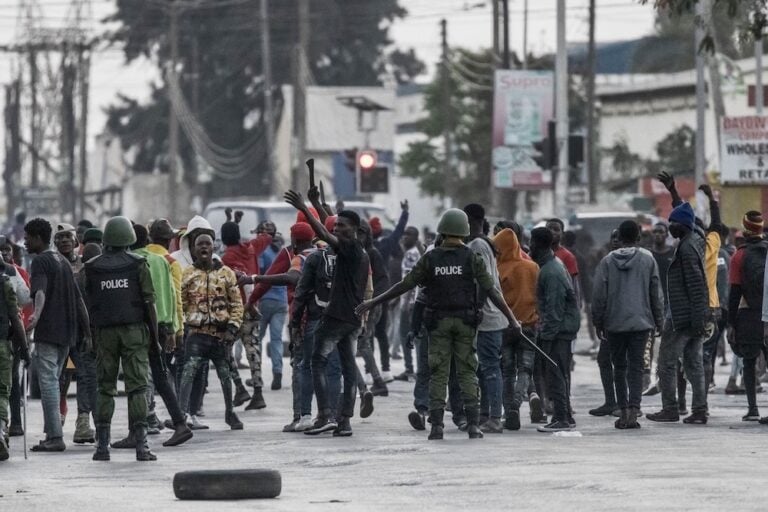(MISA/IFEX) – On 8 January 1998, police barred a South African Broadcasting Corporation (SABC) television crew and a Zambia Information Services (ZIS) cameraman from filming events outside the Lusaka High Court during the continued habeas corpus hearing of former Zambian president, Kenneth Kaunda. Kaunda, now leader of the opposition United National Independence Party (UNIP), is […]
(MISA/IFEX) – On 8 January 1998, police barred a South African Broadcasting
Corporation (SABC) television crew and a Zambia Information Services (ZIS)
cameraman from filming events outside the Lusaka High Court during the
continued habeas corpus hearing of former Zambian president, Kenneth Kaunda.
Kaunda, now leader of the opposition United National Independence Party
(UNIP), is challenging the state for its decision to hold him under house
arrest in the aftermath of the failed coup attempt of 28 October 1997. In a
statement released 8 January, the government appointed Permanent Human
Rights Commission condemned the continued police harassment of both local
and foreign journalists covering Kaunda’s case.
The privately owned “The Post” reported on 9 January that South African
television journalists, Graham Robertson and Eddie Taderera, were warned by
the police that they “risked arrest” if they ignored the order not to film.
Robertson told “The Post” that the order surprised him. He explained: “I am
obviously trying to do my job…the world wants to know what is going on but
it’s really frustrating…It’s like there is a new law everyday you come to
court.”
Zambian laws prohibit the use of tape recorders or filming equipment in all
its courts but this restriction does not extend to events taking place
outside court.
On January 6, four reporters from Reuters, Agence France Presse, Pan African
News Agency and the Zambia Daily Mail, were also prevented by police from
covering part of the Kaunda case because the court room, including the press
gallery, was said to be “full,” though this claim was disputed by other
journalists who had been inside the court. Two days later, the Zambian
Permanent Human Rights Commission issued a statement denouncing “the way in
which law enforcement officers in the last few weeks have treated
journalists wishing to cover or report on public events.” Signed by
commission chairperson Justice Lombe Chibesakunda, the statemtent declared
that “the press, both local and foreign, have a right to inform their public
of what is going on in the country and should, to this effect, be given
access to [the] places and sources of information they require, subject to
adherence to conditions which do not derogate from internationally
acceptable principles of a democratic society.” The statement goes on to
recommend that “the harassment and battering of journalists and confiscation
of their equipment will be a practice of the past in Zambia.”
Zambia Independent Media Association (ZIMA) chairman David Simpson has
repeatedly condemned the police for blocking journalists from covering the
Kaunda case, describing their behaviour as “barbarism,” “primitive,” and
“unacceptable.”
Background Information
These are the latest in a series of incidents where police have prevented
journalists from covering the Kaunda case. On 2 January, police physically
assaulted Amy Merz, a Cable News Network camera person, and attempted to
seize her camera, on suspicion that she and her colleague Bob Coen had
filmed an interview with Kaunda (see IFEX alert of 6 January 1988).
Recommended Action
Send appeals to authorities:
journalists covering the continued house arrest and court appearances of Dr.
Kaunda
</ACT
Appeals To
His Excellency President Frederick Chiluba
President of the Republic of Zambia
State House
Independence Avenue
P.O. Box 30208
Lusaka, Zambia.
Fax: 260-1-221939
E-mail: state@zamnet.zm or mfalus@zamnet.zmThe Hon. David Mpamba
Minister of Information and Broadcasting Services
P.O. Box 51025
Lusaka, Zambia
Phone: 260-1-254487 or 260-1-253486
Fax: 260-1-253456The Inspector General of Police
Mr Francis Ndhlovu
Zambia Police Headquarters
Independence Avenue
P.O. Box 50103
Lusaka
Fax: 260-1-253537
Please copy appeals to the source if possible.


